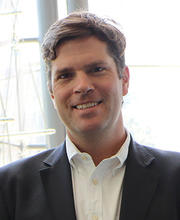Kevin C. Eggan, Ph.D.
Broad Institute

The Eggan Lab is committed to determining the mechanisms that cause motor neuron degeneration in Amyotrophic Lateral Sclerosis (ALS), and seeks to translate their discoveries into new therapeutic options for patients.
As a young investigator in the burgeoning field of stem cell biology, Kevin Eggan has garnered international recognition for his seminal work and a number of high-profile awards for his creativity and productivity, including the MacArthur Foundation “Genius Grant” in 2006. He has made fundamental contributions to the fields of stem cell biology and cellular reprogramming, which in turn led his group to pioneer an entirely new strategy for studying human disease.
While training, Dr. Eggan performed nuclear transfer studies that challenged preconceived notions concerning the limits of cellular plasticity (Eggan et al., 2000, 2001, 2004). His own lab then became the first to demonstrate that human somatic cells could be reprogrammed to an embryonic stem (ES) cell state (Cowan et al., 2005). This demonstration that human ES cells harbored reprogramming activities has been cited as an inspiration for the discovery of factors used to generate induced pluripotent stem cells (iPSCs). Through persistent reprogramming attempts, his lab became the first to generate patient-specific iPSCs and use them to produce the cell type that degenerated in that individual (Dimos et al., 2008).
As these patients suffered from ALS, he was inspired to explore stem cells as a renewable source of motor neurons for studying mechanisms leading to neural degeneration. These experiments were the first “stem cell models” of disease and enabled the discovery that astrocytes are important non-cell autonomous contributors to motor neuron degeneration in ALS (DiGiorgio et al., 2007 and 2008). Subsequently, Dr. Eggan’s group used this novel approach to study disorders that were intractable in rodents (Mekhoubad et al., 2012), discover new mechanisms that lead to motor neuron degeneration (Suzuki et al., 2013 Kiskinis et al., 2014), and finally to identify a candidate ALS therapeutic (Wainger et al., 2014).
Biosketch
Kevin Eggan, Ph.D., is Professor in the Department of Stem Cell and Regenerative Biology at Harvard University, Director of Stem Cell Biology for the Stanley Center for Psychiatric Research at the Broad Institute, and an Institute Member of the Broad Institute of MIT and Harvard.
Eggan completed his B.S. in microbiology at the University of Illinois in 1996. A two-year predoctoral internship at Amgen at the National Institutes of Health in Bethesda solidified his desire to pursue a career in academic research. He enrolled at the graduate school of Massachusetts Institute of Technology in 1998 shortly after the cloning of Dolly the Sheep was reported. During his Ph.D. training, he actively pursued projects focused on cloning, stem cells and reprogramming after nuclear transfer under the guidance of genetics pioneer, Dr. Rudolf Jaenisch. He stayed in the Dr. Jaenisch’s lab after his graduation for a one-year postdoc training in 2002. During that time, he conducted a collaborative study with Dr. Richard Axel, a Nobel Prize winner at the Howard Hughes Medical Institute. In 2003, he moved to Harvard University as a junior fellow and then became an assistant professor of Molecular & Cellular Biology at the Stem Cell Institute in 2005. In 2009, he was selected as one of 50 Howard Hughes Medical Institute Early Career Scientists receiving six years of dedicated support to conduct transformative research. Dr. Eggan was promoted to Professor in the Department of Stem Cell and Regenerative Biology in 2012.
The success of Dr. Eggan’s laboratory in the study of motor neuron disease has led to his appointment as the Director of the Stem Cell Program at the Stanley Center for Psychiatric Research at the Broad Institute. In this role he is leading a group of scientists to expand the platform to increase reproducibility of stem cell and reprogramming technologies, with the ultimate goal of improving understanding and treatment of psychiatric diseases.
Feature stories
- Accelerating a treatment for ALS
- Potential therapeutic target for ALS
- Patient stem cells help identify common problem in ALS
- From skin cells to motor neurons: researchers find success with direct cellular reprogramming
- Kevin Eggan receives Presidential Early Career Award for Science and Engineering in White House
- Another step forward in ALS and stem cell research
- Investigators develop ALS mouse stem cell line
- HSCI's Kevin Eggan receives MacArthur Foundation "Genius" Grant
